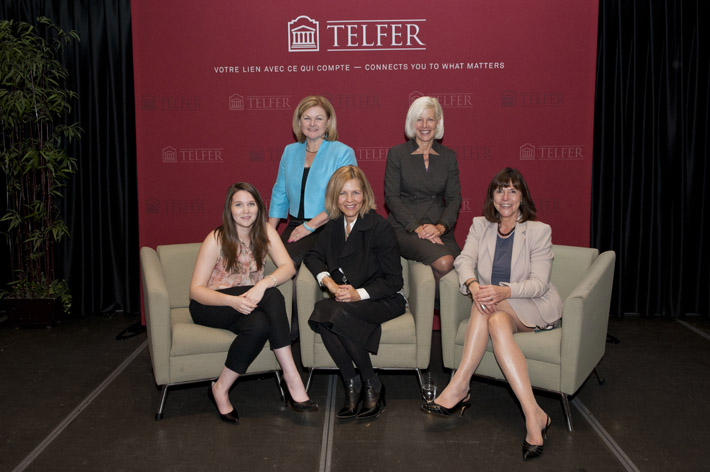The Power of Feminine Capital

To help kick-off Global Entrepreneurship Week, on Monday, November 16, 2015, the Telfer School of Management and uOttawa E-Hub hosted a book launch and panel discussion about strategies to grow female-owned enterprises. Drawing on over four decades of research, Dr. Barbara Orser and Dr. Catherine Elliott’s work Feminine Capital ‘Unlocking the Power of Women Entrepreneurs (Stanford University Press, 2015) offers new insights into the ways that gender can influence entrepreneurial decision-making.
Panelist Teri Kirk (CEO, The Funding Portal), Janet Longmore (CEO, Digital Opportunity Trust), and Kathleen Kemp (Cofounder, CIGBINS), discussed how adoption of digital technologies is enabling global engagement and enterprise growth.
- Lesson1: Fast growth enterprises are willing to learn and grow with nascent technologies. Janet Longmore, CEO of Digital Opportunity Trust, launched her multi-nation enterprise at the same time as SKYPE was entering the market. With a head office in Ottawa, deploying emerging technologies and engaging youth in both content creation and delivery have helped to ensure that this 'born global' social enterprise is a market leader in delivering community-based training around the world.
- Lesson 2: Fast growth companies capitalize on the power of the Internet. The Founding Portal CEO, Teri Kirk, shared insights about how her for-profit enterprise has deployed aggregation technology and on-line information to become the "Travelocity of funding for small- and medium-sized enterprises." Today, this bilingual, one window gateway is helping Canadian business access over 7,000 sources of government funding.
- Lesson 3: The power of a cellphone cannot be underestimated. Telfer alumni and co-founder of CIGBINS, Kathleen Kemp, described how technology, such as her cellphone, enabled this environmentally-focused enterprise to launch and scale quickly, engaging multiple stakeholders in the start-up process.
“We found that gender effects are realized in many ways, in entrepreneurial decisions and assumptions, through actions and interaction”, said Barbara Orser. “We’ve also learned that women embrace a continuum of perspectives about how gender impacts the way one does business. For some women, being female has no influence on their business practice. For others, it’s all about being female. Women spoke about how they are using experience to recognize new markets, to build brands and to drive profits.”
“The book also introduces the concept of entrepreneurial feminism. We spoke with women who are infusing feminist values through their entrepreneurial activities. They see themselves as change agents, empowering others, and in particular girls and women. Many seek women business owners to do business with. They prioritize relationship and see exchange as a means to collaborate rather than compete. By doing so, female entrepreneurs are leveling the economic playing field, one venture at a time” said Catherine Elliott. “We then translated research into practical advice, tips and learning aids by using the words of the women we encountered in our studies.”
Based on research with over 20,000 entrepreneurs, this book provides a fresh perspective about the intersection between entrepreneurship and gender. Building on their peer-reviewed studies, the authors consolidate lessons learned to answer three questions:
- What is feminine capital?
- How is feminine capital transforming entrepreneurship?
- How does entrepreneurship inform feminism?
The book should be of interest to researchers, students of entrepreneurship, management and gender studies, and those who influence entrepreneurs, including bankers, industry and sector associations, and policymakers. For further information, including sample content and book reviews visit the Feminine Capital book page.

